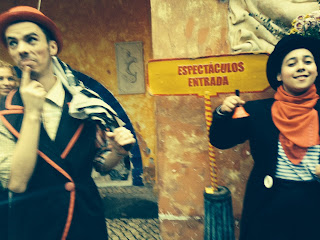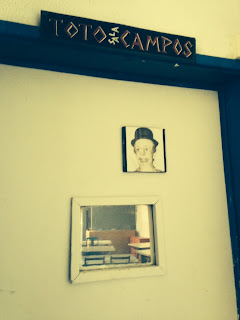My friend Bozena and I were walking down from the castle here in Lisboa in August. We stopped in a souvenir shop to buy some things and asked the woman working there if she could recommend a restaurant nearby. She recommended Chapito. We went there and were seated at a table on a big terrace and really liked it. Bozena looked up at the building in front of the restaurant and said: it can't be an apartment building because every room has a pink light. Why would everyone have the same color lights ? Later, I learned that Chapito is not only a restaurant but a school that trains young people in circus arts like acrobatics, stage design, and many other skills relating to performing arts.
And, a big part of their mission is to help young people who are from poor families, or who don't have parents or who are having other kinds of problems. The woman who started Chapito in the 1980s is Teresa Ricou, better known as Tete, the first female clown in Portugal.
http://translate.google.pt/translate?hl=en&sl=pt&u=http://pt.wikipedia.org/wiki/Teresa_Ricou&prev=search
http://folhadeportugal.pt/10-perguntas-a-teresa-ricou-“restam-me-as-memorias-umas-boas-outras-mas-que-me-vao-alimentando-a-alma”/
Chapito has now partnered with EPOAE ( Escola Profissional de Artes e Oficios do Espectáculo ) which provides high school students from all over Portugal with a 3-year training program in circus arts and theater set design and performance arts. (A lot of the links below are,in Portuguese.)
http://epaoe.chapito.org
http://chapito.org/?s=page&p=8
http://www.dgartes.pt/pegadacultural/listagemcontactos.pdf
I finally got to go to a performance there last Saturday. My friend Emily and I saw a play called Antes de Começar , by Almada Negreiros, which featured two recent graduates of the school. It was so exciting to go to a play that featured students from the school. And, it was really fun to go to a play with a big crowd of Portuguese parents and their children (mostly ages 3-7). It was a 5:00 show especially for kids and the kids were such a great audience. They sat there in rapt attention, laughing and clapping and reacting with such joy. It was a wonderful experience for me and I got to go to a performance in Portuguese. It was hard to understand a lot of the language, as usual, but since the action was so physical, it was very entertaining. And, I definitely understood the word "boneca" / "boneco" , which means "doll", as they were the main characters. Emily and I kept hearing another word which sounded like "frigideira" (which means "frying pan") but we couldn't get anyone to verify if that word was really being used in the play.
Anyway, we,were able to talk to one current student named Antonio Jose who was helping at the door. He explained some information about the school training program and the former students who were starring in the show we were about to see . Thanks to Antonio and the nice ticket seller who let us in even though we didn't have reservations and the show was very crowded. It was a very special experience for me. I also went back to the school a few days later and got more information. There are usually about 30-40 students accepted into the program each year. They have to demonstrate physical strength and ability as well as artistic ability to be accepted into the program. The fees are about 120 euros for 3 months. All in all, it seems like an exciting program which allows students to graduate with skills that enable them to work as professional acrobats, actors, set designers, etc. or, go on to further studies. I recommend that anyone who comes to Lisbon, should go see a show at Chapito, eat at the restaurant, and take a look at the gift shop, which sells a lot of handmade things made by the students. This organization has been around for about 30 years and is a very good example of the creativity and spirit that makes Lisbon so special !
















